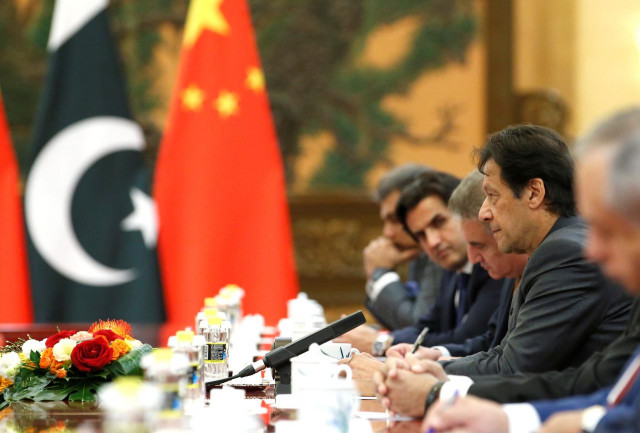China seeks additional guarantees for $6b new loan
Proposes a mix of commercial and concessional loan against Islamabad’s desire to secure cheapest lending

China has sought additional guarantees before sanctioning $6 billion loan for Main Line-1 (ML-1) project due to weakening financial position of Pakistan and also proposed a mix of commercial and concessional loan against Islamabad’s desire to secure the cheapest lending.
The issue of additional guarantees was raised during the third joint ML-1 financing committee meeting, held ten days ago, official documents said.
However, a senior Pakistani official involved in negotiations said that China did raise the additional guarantees issue during meeting but it did not make it part of the draft of the minutes shared with Pakistan.
The ML-1 project includes dualisation and upgrading of the 1,872km railway track from Peshawar to Karachi and is a major milestone for the second phase of China-Pakistan Economic Corridor (CPEC).
The purpose of raising the additional guarantees issue was getting more clarity after Pakistan availed G-20 countries debt relief initiative, he added. The draft minutes have not yet been signed by both the countries.
The third round of financial negotiations gave further clarity on the Chinese position on $6 billion lending for the $6.8 billion strategically important ML-1 project of Pakistan Railways, sources in the Ministry of Economic Affairs said.
The Chinese authorities asked for additional guarantee mechanism after Islamabad sought debt relief from G-20 countries, which was only meant for poorest nations of the world.
The G-2- nations have also imposed conditions that the poor countries would not secure expensive commercial loans, except those allowed under the IMF-WB framework.
The Chinese authorities have proposed that “keeping in view the financial situation in Pakistan so also the conditions laid down by the G-20 regulations for debt suspension, the government of Pakistan may provide additional guarantee mechanism for the loan other than sovereign loan for the ML-1 project”, according to officials privy to these negotiations.
It was surprising for us when China raised the issue of additional guarantees during the meeting, another senior Pakistani official who was part of the meeting said.
In August this year, the Executive Committee of National Economic Council (Ecnec) approved the strategically important ML-1 project worth $6.8 billion.
The Ecnec meeting had continued for hardly 20 minutes, leaving many critical issues about financing and technical details unsettled.
Both the sides have reached broad-based consensus on the technical parameters including bidding documents, according to deliberations that took place in the joint bilateral third financial and seventh technical committee of ML-1 project.
But an early start of construction work on what the official described as “strategically important project” is also unlikely after China linked the civil works with prior finalisation of financing mechanism of the single-largest project of CPEC.
Unlike Pakistan’s expectations of getting the $6 billion loan at 1% interest rate, China has proposed a mix of commercial and concessional lending, the sources said.
China maintained that the lending will be both a combination of commercial and concessional loans, according to sources.
The Economic Affairs Ministry proposed 1% rate while Ministry of Railways was inclined to take the mix of commercial and concessional rate, subject to the condition that the average rate may remain lower than 2.38%, sources said.
However, Pakistan was expecting that due to strategic nature of the project, China would accept its request for 1% interest rate and a grace period of 10 years for repayment of the loan.
China has offered to finance 85% of the project cost with payback period of 15 to 20 years in biannual tranches. Sources said the Chinese had offered five years grace period.
Pakistan has asked for up to 90% of financing and was ready to accept 20 years repayment period, subject to the condition that the grace period should be 10 years.
“The Chinese side proposed that negotiations for financing must be only to the extent of package-1 consisting of $2.434 billion and the negotiation for remaining two packages will be undertaken during implementation phase of package-I,” according to the official documents.
Pakistani authorities pressed for negotiation for the total project cost of the ML-1. China has also offered financing in Chinese currency RMB.
Pakistan Railways is not in a position to pay salaries and pensions to its employees without cash injection from the federal government. Newly appointed Minister for Railways Azam Swati hinted at closing Pakistan Railways due to poor financial conditions.
According to the ML-1 framework agreement, the project will be executed in the engineering, procurement and construction mode by Chinese contractors. Under the CPEC framework, ML-1 is the only strategic project being finalised as part of the initial $46 billion deal.
The project faces significant delays and both the Pakistan Muslim League-Nawaz (PML-N) and Pakistan Tehreek-e-Insaf (PTI) governments could not meet the originally agreed deadlines.
Sources said that Pakistan’s desire to start work on the package-1 from January 2021 would remain unfulfilled due to delay in finalisation of financing details.
Pakistan had planned to complete the package-I from January 2021 to December 2024 and will cover the construction of a 527-km track between Peshawar, Rawalpindi and Lahore.





1710175205-0/image-(9)1710175205-0-208x130.webp)













COMMENTS
Comments are moderated and generally will be posted if they are on-topic and not abusive.
For more information, please see our Comments FAQ